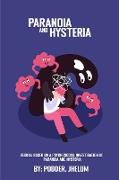- Start
- Oedipal Based on a Psychosocial Investigation of Paranoia and Hysteria
Oedipal Based on a Psychosocial Investigation of Paranoia and Hysteria
Angebote / Angebote:
What is Madness? Cambridge Advanced Learner's Dictionary & Thesaurus (2018) defines madness as ¿the state of being mentally ill or unable to behave in a reasonable way¿ or it ¿refers to behaviour that is not reasonable when considering certain situations¿ (Cambridge Academic Content Dictionary, 2018). According to Andrew Scull (2015) modern psychiatry tends to rob madness of its meanings by directing the cause of the ravages of mental illness upon only biology. But, biology only provides incomplete information. The social and cultural dimensions of mental disorders which have been the indispensable part of madness and civilization over the centuries are unlikely to melt away, or to prove no more than a universal feature of human existence. Madness indeed has its meanings which is as elusive and evanescent as our attempts to capture them have been. The long and tangled history of Western culture provides a rich array of images of popular and professional beliefs about insanity. The Judeo-Christian sacred books are replete with stories of madness caused by possession by devils or divine displeasure. Prevalent diseases in the ancient, medieval, and early modern world were often attributed to religious causes. The spread of Christian belief through pagan Europe was often facilitated by the use of miracles and wonders to demonstrate the power of the Christian God. Saints and martyrs claimed to have the ability to cure sick and tortured souls through their relics that were believed to have miraculous power to heal the sick, reanimate the stuporous and the lame, and restore sight to the blind. Naturalistic accounts of madness, whose roots lied in the body, had an ancient lineage as well. Though many still embraced supernatural accounts of mental disturbance in classical Greece and Rome, others believed in Hippocrates' humoral model of disease and Graseco-Roman physician, Galen's model of illness, both mental and physical, that would survive in Europe into the nineteenth century. Though religious interpretations of mental disturbance persisted well into the eighteenth century, medical models of mental disorder gradually became the dominant and then almost the only legitimate interpretation of the sources of mental distress,
Fremdlagertitel. Lieferzeit unbestimmt




